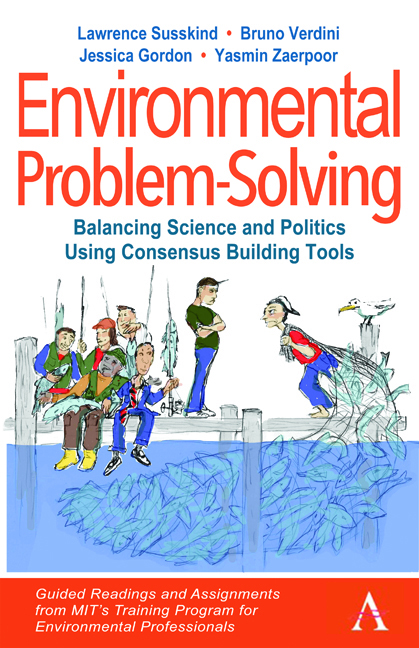 Environmental Problem-Solving: Balancing Science and Politics Using Consensus Building Tools
Environmental Problem-Solving: Balancing Science and Politics Using Consensus Building Tools Book contents
- Frontmatter
- Contents
- Acknowledgments
- Credits and Permissions
- Introduction
- Unit I: Influencing The Environmental Policy-Making Process
- Unit II: Ethical Dilemmas In Environmental Problem-Solving
- Unit III: Developments In Policy And Project Analysis
- Unit IV: Collective Action To Solve Environmental Problems
- Final Exam
- Conclusions
- Biographies
- References
- Index
Unit IV: - Collective Action To Solve Environmental Problems
Published online by Cambridge University Press: 15 December 2020
- Frontmatter
- Contents
- Acknowledgments
- Credits and Permissions
- Introduction
- Unit I: Influencing The Environmental Policy-Making Process
- Unit II: Ethical Dilemmas In Environmental Problem-Solving
- Unit III: Developments In Policy And Project Analysis
- Unit IV: Collective Action To Solve Environmental Problems
- Final Exam
- Conclusions
- Biographies
- References
- Index
Summary
Introduction
Unit IV highlights the vital connection between environmental problemsolving and democratic decision-making. While individual consumers and citizens can certainly make environmental improvements on their own (e.g., by recycling household waste or reducing their personal carbon footprint), most environmental problem-solving requires collective action—either by whole communities, whole countries or even all the nations of the world acting together. Unfortunately, it is not easy to generate agreement at any of these levels. Stakeholders often start with conflicting philosophies. Additionally, a high likelihood that any proposed solution will affect them differently. Since self-interest is an important motivation, some way of resolving these underlying conflicts and making sure that multiple interests are met simultaneously must be found.
Groups with different interests often define problems in ways that reflect their biases. They see what they want to see and hear what they expect to hear. They advocate methods of analysis that will yield results that support the outcomes they favor. This brings us back to the claim we made at the outset of this book: environmental problem-solving will inevitably involve both science and politics. It requires science, because a popular agreement that does not actually solve a problem is of little use. It requires politics, because almost all collective action requires some form of effective government involvement.
The chapter begins with an excerpt from Breaking Robert's Rules. In it, Lawrence Susskind and Jeffrey Cruikshank advocate for a consensus-building approach to mediating conflicting interests. Although consensus building is oftentimes more time and resource intensive, the authors argue that it is more likely to lead to fairer, wiser, more efficient and more stable outcomes. In other words, they advocate for a more democratic and inclusive approach to decision-making.
Ian Shapiro's excerpt summarizes what political philosophers know about collective decision-making in democratic settings. He also discusses whether citizens have a right to participate in decisions that affect them. You will see that we hold to the belief that majority rule, the usual way in which citizens make decisions in a democracy, is not good enough. We would rather see contending groups attempt to reach agreement whenever they engage in environmental problem-solving. Why should they not try? The worst case is that they fall back to majority rule.
Information
- Type
- Chapter
- Information
- Environmental Problem-Solving: Balancing Science and Politics Using Consensus Building ToolsGuided Readings and Assignments from MIT's Training Program for Environmental Professionals, pp. 329 - 470Publisher: Anthem PressPrint publication year: 2020